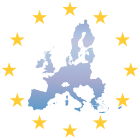
With less than three weeks to go to polling day for the European elections, it's time to focus on what is going to happen. Most opinion polls headline what is happening in the UK as a whole, rather than what will happen in each country, but I'm going to start by looking at Scotland.
In the latest published YouGov poll (for the Sun, 13/14 May) the headline European voting intention in Scotland is:
SNP ... 40%
Labour ... 21%
LD ... 14%
Con ... 13%
Greens ... 4%
UKIP ... 4%
That is an amazing lead. Scotland's representation has been reduced to 6 seats in this election (if Scotland were independent it would probably have 14 seats, and if we were independent we'd have 11 ... but that's another story). It would give the SNP 3 seats, with Labour, the Tories and the LDs on one each. That will be a big success for the SNP.
-
From the same data it's hard to work out what would happen in Wales because Wales is included with the Midlands. Before the Telegraph got into full swing I thought that Plaid, Labour and the Tories would all poll in the mid-twenties, but I wasn't at all sure what the order would be. Each of these three parties will win one seat. The only real question is who will win the fourth (and final) seat. It's very hard to see either the LDs or UKIP getting more than half the vote of the biggest party, so the fourth seat will be won by the party with the biggest vote. A week or so ago I didn't have much confidence that it would be Plaid.
But since then the scandal over MPs' expenses has deepened, leading to a large part of the population baying for political blood. I might question the direction in which some of that anger is aimed, but the anger is genuine and justified. The YouGov poll shows a huge surge in support for UKIP as a reaction against the three big UK parties. But what does that mean for Wales?
As Vaughan Roderick noted in his blog today, UKIP draw their support from the right. So any growth in their support will be at the expense of the Tories. A week or so back I genuinely feared that the Tories might get the biggest share of the vote in Wales, but if that gets split with UKIP they won't.
Labour, it goes without saying, are in freefall. Their UK figure is now 20%. In Wales that will be higher, but maybe only 25%. The champagne socialism of the likes of the Kinnocks and Touhig, which has got up my nose for years, has now got up everyone's nose!
-
Which of course leaves Plaid. These may be "famous last words" on my part, but none of Plaid's MPs has been doing anything other than making reasonable claims for accommodation that nobody would question they need because of the distance and travelling time to London. After all, if UKIP are getting kudos for being seen as "clean" (even though, as VR points out, one of their MEPs was jailed for making false claims and another is facing fraud charges) then Plaid are certainly cleaner.
All this can only push Plaid's vote up, to the point where I now believe we can and will get somewhere around 27% of the vote, and therefore win the fourth Welsh seat. As support for Labour plummets, what other party will people with generally left leaning views vote for? The biggest challenge is to get people out to vote rather than stay at home in disgust, because not voting means that nothing will change.
-
Finally - even though, sadly, it seems that this election is going to be focused more on the misuse of privilege and the integrity of our elected representatives than it should be - we need to remember that elections are about policies. Irrespective of the candidates the parties put up, it is the policies they enact which effect our daily lives.
So with that in mind, I'd invite people to click on the picture and read the Plaid manifesto.
But if manifestos aren't your thing, then ask yourself this question instead:
Is it better to have MEPs from a UK party in the European Parliament ... or MEPs from a party that stands up and fights for Wales?



1 comments:
As a Plaid voter, I've had a quick read of the Plaid manifesto and I have to say there are parts which are dripping wet!
People are concerned about their jobs and are skeptical of the EU and Plaid is coming out with the kind of language you'd get from 1992. Plaid seem to imply that the EU should have more power, that we should have totally open borders and that people who've been resendent here for a few short years are entitled to all benefits. It's just not realistic. I can't see Plaid gaining the second seat 'cos their seen as too soft and too wet.
Post a Comment